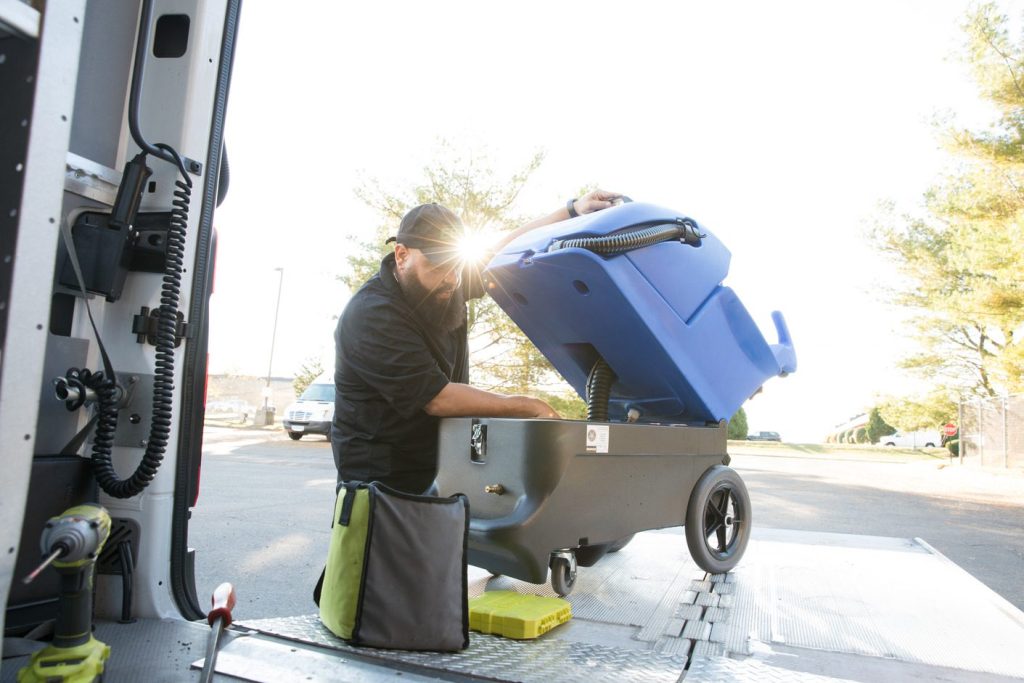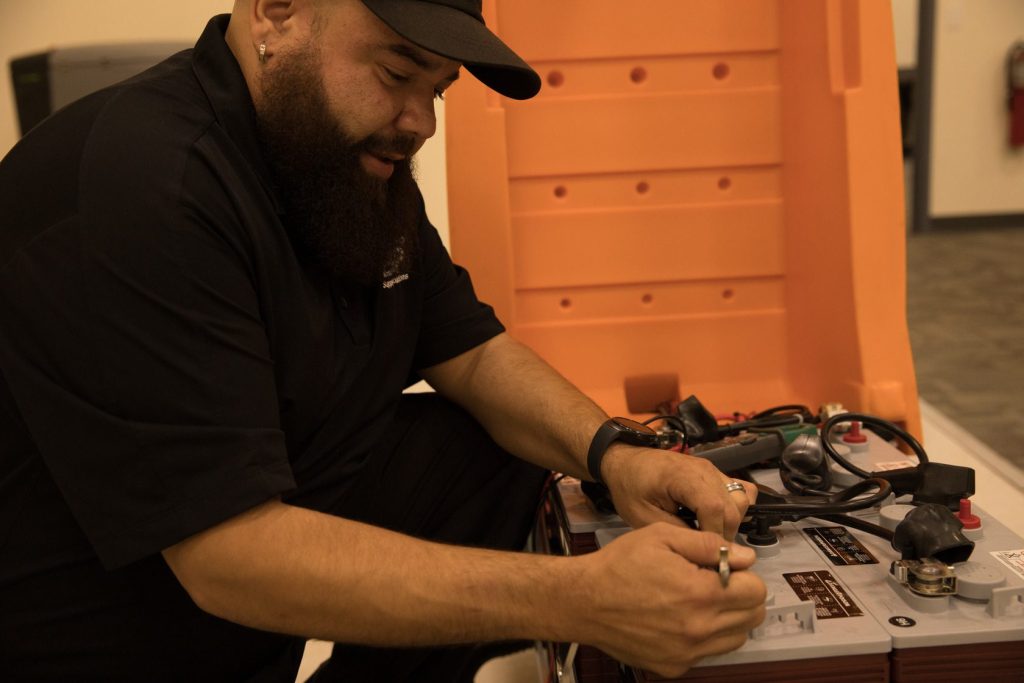If you own or operate janitorial equipment, or are a facilities manager that oversees equipment operation, you know the expenses that come with it. Operating expenses can be high.
While equipment can be pricey, it is an investment. Just like any good investment, the longer you hold on to it, the more your returns grow.
When you purchase a new piece of equipment, you expect that it’ll produce a certain return on investment (ROI). Simply put, ROI, as defined for this article, is the amount of money that is generated or saved by your equipment investment.
When equipment maintenance and care are performed properly, and the machine exceeds its expected lifespan, you’re getting a better ROI. But, if you don’t take care of your equipment, and it breaks down before it could reach the end of its intended lifespan, you’ve lost money on your investment.
Essentially, taking better care of your equipment also means it can stay in operation longer, providing you with a better return on your initial investment.
It’s important to regularly maintain your equipment, pre and post-use, so that you can extend the equipment’s lifespan and get your full money’s worth.
So, what is the best way to extend the life of your equipment investment?
Below, we explain five key ways to extend the useful life of equipment.
5 Ways to Extend the Useful Life of Equipment
When it comes to extending the useful life of equipment, these are some of the most effective methods you can implement right away:
- Hire a Janitorial Equipment Specialist to Build a Preventive Maintenance Program
- Train Operators and Supervisors in Daily Equipment Maintenance
- Follow the Manufacturer’s Guidelines for Daily Equipment Maintenance
- Develop an Equipment Checklist for Proper Pre & Post Use
- Perform Regular Maintenance to Avoid Extensive Damage From Equipment Wear and Tear
Hire a Janitorial Equipment Specialist to Build a Preventive Maintenance Program
Having a regular preventive maintenance program in place is a great way to extend the useful life of equipment, and can cut down on reactionary repairs.
Preventive maintenance programs can cover adjustment, alignment, calibration, disposal, inspection, installation, inventory, maintenance, repair, replacement, testing, or training, depending on the equipment involved. But at the end of the day, it’s up to the person in charge of building your program to decide what gets performed and how frequently.

We recommend that the program be developed by a third party, like your distributor, or an industry professional. While it’s okay to have your inhouse janitorial team or equipment operators perform on-the-spot repairs, you should leave the regular servicing to a professional.
This person will get down and deep into the janitorial equipment and have the ability to see and find things that an operator may not notice. This can help prevent any major issues down the road that could cause down time, loss in production, and have to pay out more labor hours if the task or tasks have to be done another way.
Typically, the company that the equipment is purchased from also has a team of service professionals who have been factory trained on all the equipment they sell.
This means the person you have performing the preventive maintenance has also received the correct training, so you can be comfortable knowing your janitorial equipment is being well cared for on a regular basis.
Pro Tip: It can help to purchase your janitorial equipment from a reputable distributor, often, they will offer reminders about scheduled preventive maintenance visits so you don’t have to.
Train Operators and Supervisors in Daily Equipment Maintenance
Provide formal training on equipment maintenance to operators and staff. It’s a great way for them to learn how to properly care for the machines they’re operating. An operator’s knowledge of basic usage and maintenance assures that when a small problem does pop up, it can be properly addressed.
The ability to address basic issues before they turn into larger problems is key to extending the useful life of your equipment.
Pro Tip: For new hires, it’s a good idea to make operator training a requirement. This is because there is a massive turnover rate in the janitorial industry, as much as 200%.
Operators that are trained in daily equipment maintenance, like how to refill wet batteries or clear the drain hose, cause less daily wear and tear to the machinery because they know how to treat it.

The best way to train your staff is to enlist the aid of an industry expert on janitorial equipment.
They could be, for example, someone from the distributor who you purchased the equipment from. As part of the partnership with their customers, most companies that sell janitorial equipment have an “Equipment Specialist” on board who does training and demonstrations with new or existing equipment.
It could also be a representative from the manufacturer of the equipment you own. Manufacturers usually have someone in your area to help support their distributors’ customers. These specialists will train your staff on how to safely operate the machine and how to perform regular daily maintenance that can increase the equipment lifespan.
Pro Tip: An added benefit of training is empowering and instilling pride in your employees. By investing in them, you’re showing that you, as an employer, value them.
This ends up saving you time and money on repairs and equipment downtime when daily maintenance by staff catches a problem before it can turn into a more serious, expensive defect.
Another benefit of fixing small problems before they become expensive is that it can extend the time between routine service, saving you money on hiring an outside professional.
Follow the Manufacturer’s Guidelines for Daily Equipment Maintenance
Always have a copy of the operator’s manuals available for the staff.
This benefits your staff by giving them a resource to refer to after they’ve had formal training. Sometimes, during training, there could be a lot of information to take in, so having the manuals to refer to will help. The owner’s manual should cover everything that was discussed during the formal training.
There are a number of ways that you can do this if you no longer have access to a physical copy.
These can usually be obtained by going online to the manufacturer’s website. If it’s not online, you can directly contact the manufacturer, or your distributor’s rep, to see if they can assist you in obtaining a copy.
The owner’s manual will explain how to properly use and care for the equipment. It often outlines suggested timelines and routines for daily, weekly, monthly, and annual equipment maintenance.
By following the manufacturer’s specifications without fail, you ensure that the machine receives ideal care, is operated efficiently, and gets serviced at the appropriate intervals. That’s why we consider following the equipment maintenance and use guidelines in the owner’s manual one of the best ways to extend the useful life of equipment.
Develop an Equipment Checklist for Proper Pre & Post Use
Having an equipment checklist posted in the area where the janitorial equipment is being prepped and cleaned after use can be very helpful for the operators.
This will ensure that when the janitorial equipment is prepared for use, it is being set up safely and correctly. This also ensures that after use, the equipment is getting cleaned and stored properly.
Both pre and post care are very important for extending the equipment lifespan. Keeping janitorial equipment clean and well maintained will increase its operational efficiency, leading to better performance and a more thorough clean. This stretches out equipment lifespan a significant amount.
Take an auto scrubber, for example; before use, the operator should unplug the battery charger, fill the machine with water and the proper floor cleaning chemical, check the squeegee blades to make sure they’re in good shape, and then make sure there are no obstructions on the solution filter.
Pro Tip: For an example of what one of these checklists might look like, check out our Daily Operator Checklist Template for maintaining autoscrubbers.
At the end of use, these steps will be reversed; the machine gets emptied, all the other components will be inspected and cleaned, and the battery charger will be plugged in.
Failure to follow pre and post care for an autoscrubber can negatively impact the equipment. For eample, leaving equipment dirty overnight accelerates the damage done by regular wear and tear, while contaminants like mud, grease, and chemical residue can promote corrosion of internal components.
Once the tasks are completed it’s a good idea to have the employee sign off and date the checklist. This way there is some accountability. Holding your operators accountable with an equipment checklist is important because it can help foster a sense of responsibility.
It encourages them to make sure that, at the end of the day, the janitorial equipment is clean, functioning, and put back where it belongs.
Perform Regular Maintenance to Avoid Extensive Damage From Equipment Wear and Tear
Equipment maintenance should be regular, not reactive.
When it comes to periodic maintenance, it’s always best to hire professionals. Operator maintenance is good for fixing problems that stem from daily equipment wear and tear, but leave the periodic maintenance to a professional.
This is also where it helps to purchase janitorial equipment from a good distributor. Often, they offer reminders of regularly scheduled maintenance appointments, saving you the hassle.
Janitorial equipment servicing should be performed on an on-going, regular schedule. One of the biggest benefits of adopting a regular equipment maintenance schedule is that it will reveal problems (e.g. cracks, loose fasteners, broken parts, etc.) before they turn into huge issues.
If you allow the janitorial equipment to fall behind on regular maintenance, it’s simply an invitation for a major machine breakdown. Daily use, like vibrations, shocks, high temperatures, friction, and wear from age can cause damage over time.
Daily equipment wear and tear may seem minor, but it does end up shortening the useful life of equipment. That’s why it’s important to develop a regular equipment maintenance schedule, and stick to it.
Final Thoughts
The upfront cost of equipment is high, so doing everything in your power to extend the equipment’s lifespan is crucial if you want a solid ROI.
Hiring an outside specialist to develop a periodic maintenance program for your equipment is a great place to start. If you’re not sure where to start, reach out to your distributor or the equipment manufacturer.
More than just scheduled maintenance, it’s important to train your equipment operators how to properly use and care for their equipment. By offering training, you ensure that they are receiving the right instructions on pre and post care.
If you’re not sure how to properly instruct your operators on equipment care and maintenance, refer to the manufacturers guidelines. These handbooks typically contain best practices for storage, maintenance procedures, operation, and cleaning procedures, as well as recommended timelines for periodic maintenance.
A great way to help ensure the equipment operators are using the skills they learn in training, provide them with an equipment checklist for pre and post use. For an idea of what one might look like, check out our template!
Lastly, don’t forget to follow a periodic maintenance schedule. Reach out to an industry professional to develop a regular routine so that your equipment is receiving the proper care on time.
At Imperial Dade, we have preventative maintenance professionals who can create a solid maintenance program for your business. Our experts will evaluate your janitorial equipment and suggest preventive care based on your needs.
We judge janitorial equipment on a rating scale to see which machines are in good shape, which machines need maintenance, and which machines are on their way out the door.
Reach out today for a free consultation.
